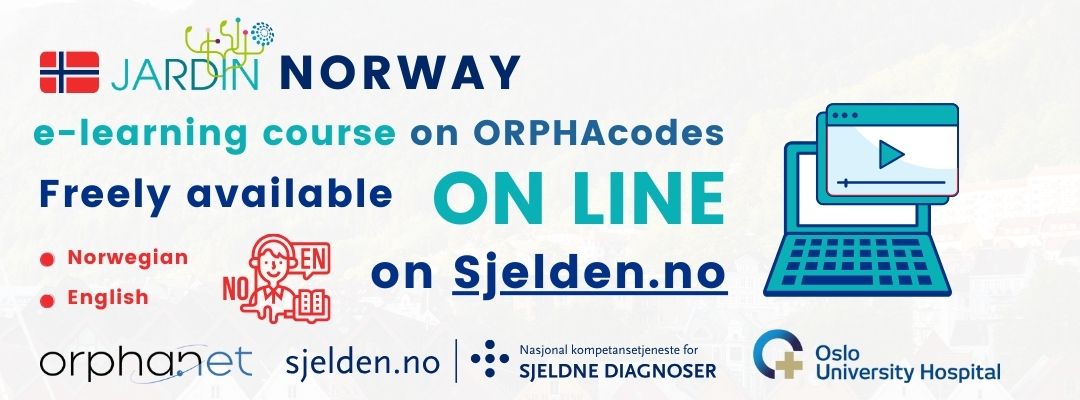Norway launches e-learning course on ORPHAcodes
September 1st, 2024
-
- JARDIN
- Rare Diseases
- Research

Event information
-
Location:
Freely available online on Sjelden.no
-
Start Date:
September 1st, 2024
-
End Date:
September 30th, 2024
-
Language:
Norwegian and English
-
Event mode:
Online
Oslo University Hospital (OUS) launched an e-learning course on ORPHAcodes in both Norwegian and English, marking an important step in sharing expertise on rare disorders nationally and internationally
The course was developed by Oslo University Hospital (OUS) through its Norwegian National Advisory Unit on Rare Disorders (NKSD) in collaboration the international EU-supported organisation Orphanet and is now freely available on the knowledge portal Sjelden.no.
Improved diagnostics and treatment
ORPHAcodes enable more precise identification and classification of rare disorders, which is crucial for both clinical practice and research.
More and more health trusts in Norway and clinics in Europe are in the process of implementing ORPHAcodes in their patient systems, making knowledge about the coding system increasingly important.
By offering the course in both Norwegian and English, Norway ensures that this valuable knowledge is accessible to both national and international audiences.
The course contributes to strengthening expertise on rare disorders in Norway and across Europe, promoting a more unified approach across national borders.
The course covers both theoretical and practical aspects of ORPHAcodes, including their significance for accurate diagnosis, improved patient care, and research.
Toril Orrestad, Chief Advisor in South-Eastern Norway Regional Health Authority and competent lead for JARDIN Norway, emphasizes the significance of this work:
— By offering this e-learning course in both Norwegian and English, we are not only strengthening competence on rare disorders in Norway but also contributing to international knowledge sharing. This dual-language approach, combined with our collaboration with JARDIN and Orphanet, promotes a more unified and comprehensive understanding of rare disorders across borders.
Looking ahead
Following the launch of the e-learning course, JARDIN Norway is now preparing to contribute to work on Sjeldenregisteret (The Norwegian Registry on Rare Disorders) through Work Package 8 (WP8) of the JARDIN project. In this project, a group of experts is currently working to identify why it can be difficult to share important information between different countries and regions in Europe. They will also provide suggestions on how to make it easier to exchange data.
The goal is to improve collaboration across borders for researchers, authorities, and others who need access to information. By removing barriers to data sharing, the hope is to solve problems and create new opportunities both locally and across Europe. More details on this development will be shared in the next newsletter.
Access and Information:
 CONTACT
CONTACT









